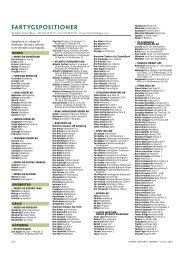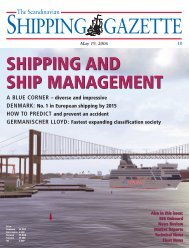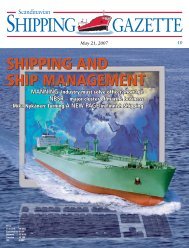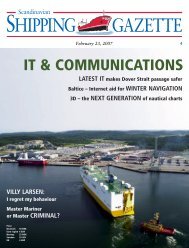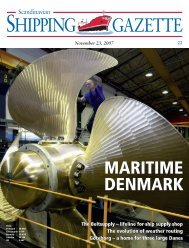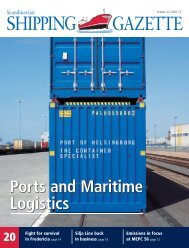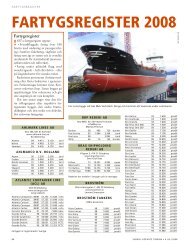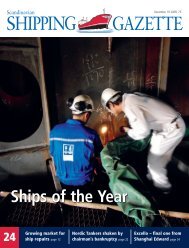SSG No 20 - Shipgaz
SSG No 20 - Shipgaz
SSG No 20 - Shipgaz
You also want an ePaper? Increase the reach of your titles
YUMPU automatically turns print PDFs into web optimized ePapers that Google loves.
Tax package born<br />
by horse-trading<br />
From time to time politicians<br />
do the wrong thing for the<br />
wrong reason. Sometimes<br />
politics gets in the way of<br />
reason and results tend to be<br />
unpredictable and often unintended. The<br />
new <strong>No</strong>rwegian tax package for shipping<br />
is a case in mind. It’s not at all surprising,<br />
bearing in mind that the current government<br />
is the most left wing ever in the<br />
country’s history.<br />
The minister of finance, Kristin Halvorsen,<br />
who is also the chairperson of<br />
the Socialist Left Party (Sosialistisk Venstreparti),<br />
is completely bent on cracking<br />
down on high earners, in this case the<br />
shipowners. Officially she says she needed<br />
the money to balance the budget, but<br />
it sounds hollow.<br />
Based on official figures, shipowning<br />
companies have to pay NOK 14 billion<br />
in deferred taxes calculated at book value.<br />
This is a two thirds of the total amount<br />
of NOK 21 billion as one third can be<br />
invested in a government environmental<br />
fund. The carrot is that when owners<br />
begin to pay their back-tax they will have<br />
the privilege to join a <strong>No</strong>rwegian tonnage<br />
tax system in line with that in the European<br />
Union. Those owning companies<br />
in the tax system choosing to leave the<br />
country will have to settle their tax bill in<br />
full before they leave and based on market<br />
value rather than book value.<br />
The back-tax payment and the introduction<br />
of a new tonnage tax system are all<br />
part of a new maritime strategy from<br />
the leftist government. The government<br />
wants lower NOx and CO2 emissions<br />
from <strong>No</strong>rwegian ships, but at the same<br />
time it deprives the owners of the funds<br />
to invest in new, environmentally friendly<br />
vessels. An example shows that NOK<br />
14 billion would buy <strong>20</strong>0 new gas-driven<br />
offshore vessels, which would reduce<br />
NOx emissions by 90 per cent and CO2<br />
by <strong>20</strong> per cent. This is only one of many<br />
inconsistencies in the new strategy.<br />
When the current government took<br />
office its program was and still is embedded<br />
in the so-called Soria Moria declaration.<br />
In this declaration shipping and<br />
maritime industry at large is a priority.<br />
Government agencies<br />
do not inspire innovation.<br />
Rather, they prevent it,<br />
at least in <strong>No</strong>rway.<br />
But alas, matters change and the threeparty<br />
government are now questioning<br />
the very basis for some of the strategies.<br />
For this is a government of the left and<br />
it relishes the fact that they control 65<br />
per cent of the Oslo Stock Exchange by<br />
value.<br />
The government has no coherent industrial<br />
policy for the maritime sector and<br />
frighteningly scant knowledge of the<br />
dynamics of this sector. They do not,<br />
apparently, see the connection between<br />
strong shipowning companies and the<br />
future of the maritime industry. We have<br />
noted this before; the shipowning companies<br />
are the maritime industry’s home<br />
market, where new products are developed<br />
and tested. Without this home market, the<br />
maritime industry will suffer.<br />
As expected the maritime industry<br />
– including the shipowners – is far from<br />
enthusiastic about the new maritime strategy,<br />
although everyone applauds the new<br />
tonnage tax regime. Otherwise there are<br />
only words like innovation, environmentally<br />
friendly shipping, funding through<br />
numerous government agencies etc. We<br />
have been here before and with this government<br />
we will be here for some considerable<br />
time.<br />
Government agencies do not inspire<br />
innovation. Rather, they prevent it, at<br />
least in <strong>No</strong>rway. The <strong>No</strong>rwegian maritime<br />
industry has been a success story for a<br />
good many years and the shipowning<br />
companies are an integral part of what is<br />
widely known as the maritime cluster. But<br />
since the advent of oil and gas in <strong>No</strong>rway<br />
the maritime cluster seems to have faded<br />
in importance. Most national politicians<br />
do not fully understand the marine sector<br />
and especially not shipping.<br />
Never have so many talked such nonsense.<br />
But the Labour Party has understood<br />
that <strong>No</strong>rwegian shipping must have<br />
operating conditions on par with their<br />
international competitors. However, the<br />
only way to get an EU style tonnage tax<br />
system accepted by the Socialist Left Party<br />
was to make shipowners settle deferred<br />
taxes in what must, surely, be the biggest<br />
political horse-trading in <strong>No</strong>rwegian history.<br />
The government will never admit to<br />
horse-trading, but there is always a price<br />
to pay for the Labour Party if it is to carry<br />
it’s two, smaller government partners<br />
along.<br />
<strong>No</strong>rwegian shipowners have long since<br />
waved goodbye to stable and predictable<br />
governments.<br />
p e t t e r a r e n t z<br />
Editor, <strong>No</strong>rway<br />
Phone: +47 33 40 12 00, E-mail: petter@shipgaz.com<br />
SCANDINAVIAN SHIPPING GAZETTE • OCTOBER 26, <strong>20</strong>07 11



